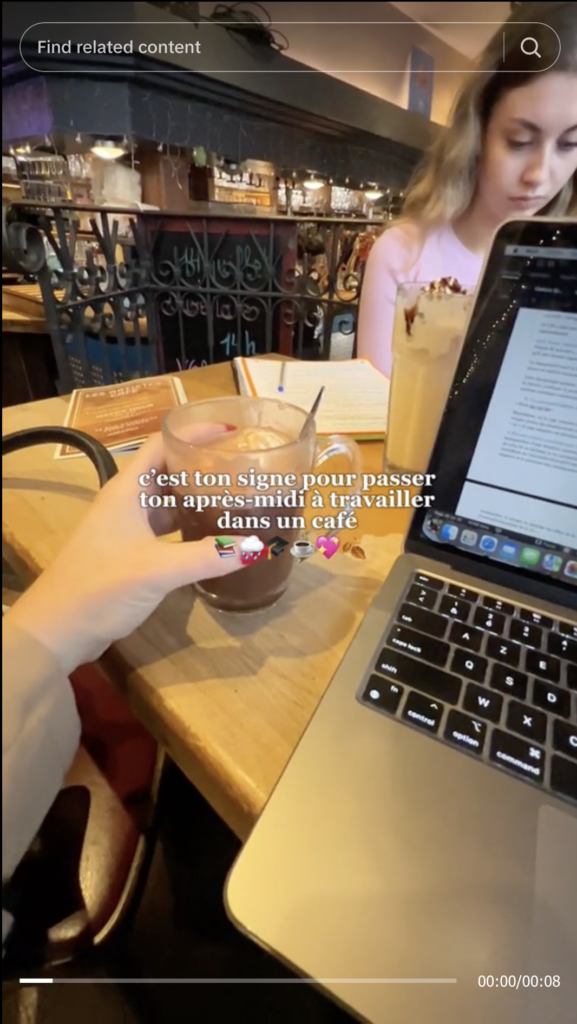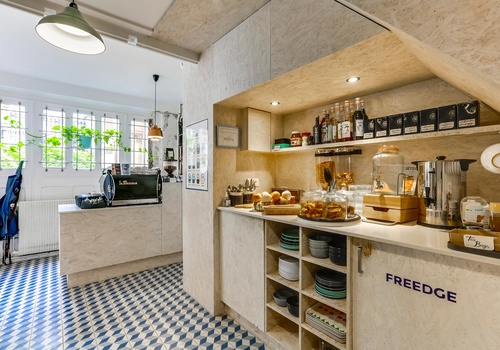The phrase “Parisian Café” conjures up a movie stereotype: Europeans whiling away their afternoon outdoors, drinking an espresso and chatting with a cigarette in hand. That image has been immortalized in La La Land, Before Sunset and Amélie. In fact, we have become so acquainted with associating cafés to Paris that in the thumbnail for Emily in Paris, Netflix features Emily sitting in an outdoor café with a cocktail, not in front of the Eiffel Tower, or the Arc de Triomphe.
Yet, COVID’s impact did not spare France’s food and beverage industry. The pandemic resulted in 100,000 workers leaving the industry, and as a result, Paris has lost around 500 cafes from 2002 to 2023. Still, in the midst of these dwindling numbers, work cafés have opened as the post-pandemic remote work routine has drawn people to the idea of getting out to work spaces.
A new type of café offers work space and free light food and drink for an hourly charge. This payment model is commonly referred to as the “Anti-café” model, after the pioneering chain Anticafé. Nuage Café, Hubsy café & coworking and Craft Café are other spaces in Paris which have adopted this operation style which has become popular with both Parisian workers and students.
Methods to “romanticize studying” have become a popular topic of conversation, especially among high school and college female students who share their personal attempts on TikTok. One such means of jumping in on this trend is to set up shop at a local cafe for a change of environment.
“[I]n recent years, the French café scene has undergone a transformation,” Poppy Pearce wrote in an article in France Today. “With the rise of home-working and freelancing, many have turned to cafés as an alternative workspace.”

says “This is your sign to spend your
afternoon working in a café”
At Nuage Café in Paris’s Latin Quarter, customers are given a white card which, once scanned, monitors the amount of time spent at the cafe. After check-in, they are offered a free array of crackers, tea cakes, biscuits, and other finger foods laid out on trays and in glass jars, ready to be self-served in the colorful plates set aside. The barista behind the counter in the corner also offers free lattes and refills among other beverages.

One recent March afternoon, Jasmine Deonandan – an American student temporarily studying in Paris – decided to work on her presentation slides at Nuage. Sitting among the ambient sound of clicking laptop keys and rustling pages from people working nearby, she momentarily turned her attention to the slice of tea cake and glass of hot chocolate by her computer. Once she had had her fill of food and work, she returned the card at the front, and paid a €6 per hour charge.
“I think especially being in Paris, a lot of the cafes are more of a leisure time activity,” Deonandan said. “But I think that the pay per hour structure encourages me to do as much work as I can to make the payment worthwhile.”
Still, working at cafés is not only attractive to students, but a range of different clients.
As a writer for France Media Group, Pearce enjoys working at cafés because it limits distractions. “I’m very inspired by peer pressure, so if I see other people working I have to work just as hard as them,” she said.
Nevertheless, Pearce admits to prefer working at cafes with a typical payment model as opposed to the Anti-café one. “€5 an hour doesn’t sound like a lot but sometimes, you know, I’d want to be there for about three hours, and that’s €15 so it does add up,” Pearce said.
Still, she acknowledges that it is an appropriate model from a business point of view because “if someone goes to a cafe, works there and takes up a table for four hours, and only buys one coffee which realistically takes 15 minutes to have, [the cafe] could have been creating so much more revenue.”
Garance Dagher, a staff member at Nuage Café, says younger clients typically stay for about two hours while some business owners spend their entire work day there.
For such reasons, it is a challenge for cafes with traditional payment models to have such clients who wish to work extensively from there. Several places have been trying to combat this problem by putting up “no laptop” or “laptop free zone” signs, so that they can have a quicker customer turnaround and maintain the more traditional atmosphere of a French café where ideas are known to be exchanged through conversation.
Still, Pearce draws an interesting comparison between the atmosphere at traditional cafés and today’s work cafés by reminiscing on the Enlightenment period during which intellectuals like Hemingway and Franklin would exchange ideas sitting in cafés in Paris.
“In a way, ideas are still being passed, maybe not verbally in the way that they were back [then], but there’s a rise in freelance workers, and them using cafes as a base, I suppose, could mirror that previous culture,” she said.
